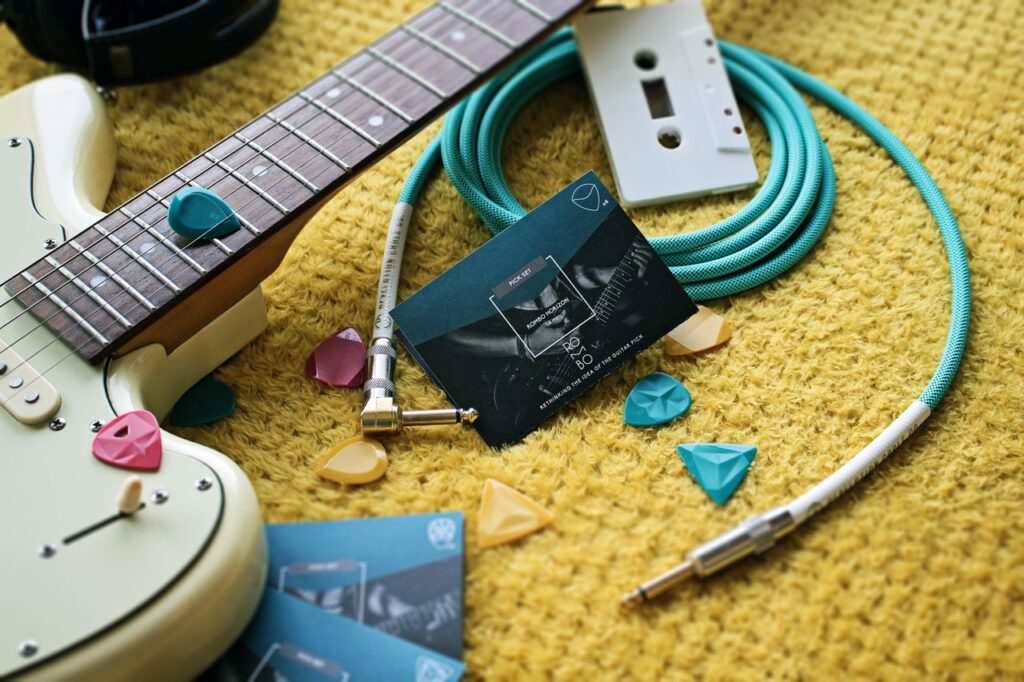Why or When Do You Need a Neck Reset?
Resetting a guitar’s neck is not a common phenomenon for a typical guitar player unless they have a large collection, many of which go unused for some time. But even so, the event is rare, and if it does happen, it can be frustrating, but why does it happen?
 Neck bending occurs when the neck of the guitar bends slightly forward. This bending is caused by the strings’ constant pull on the headstock over time, and the constant pulling will pull the neck like a string bending a bow.
Neck bending occurs when the neck of the guitar bends slightly forward. This bending is caused by the strings’ constant pull on the headstock over time, and the constant pulling will pull the neck like a string bending a bow.
Of course, the change is barely noticeable, but the effects are. One major side effect is the noticeable distance between the frets and the strings. Playing the guitar with this symptom is frustrating as fingers can be “tripped” or snagged as they move between strings; good luck playing guitar scales on that.
It also requires more energy to push down on the strings to get a decent sound. Practicing on a guitar like this can contribute to bad playing habits.
If your guitar has this symptom, this is when you know you need the reset. The next question is how.
How to Reset Your Neck Guitar?
The first thing is to look for luthier services near you or contact the manufacturer of your particular guitar as they might have a local service center in your area. Otherwise, you will have to resort to third-party services.
What is the Cost for a Reset?
 The cost of repair will depend on the age of the guitar, what brand, size, etc. The older the guitar, the higher the probability it will be hard to find parts, or they have to be sourced overseas, especially if you are opting for a third-party luthier service.
The cost of repair will depend on the age of the guitar, what brand, size, etc. The older the guitar, the higher the probability it will be hard to find parts, or they have to be sourced overseas, especially if you are opting for a third-party luthier service.
Branded parts may also result in higher costs because if it’s branded, the quality should be better than generic ones. Finding the same component to match the original will also help preserve the instrument’s authenticity. The range to expect for neck replacement is anywhere from USD 200.00 to USD 700.00.
At this range, you have to decide if it’s worth it. If the guitar costs thousands, then it’s a worthwhile expense, less than a thousand dollars, then you have to choose whether to just buy a new one.
What Causes Neck Bending in the First Place?
Acoustic guitars are made primarily with wood, and wood is a malleable material, but a more accurate term to use is it has plasticity. Malleability is a term reserved for metals. So it has plasticity.
If you look for videos or articles on how to bend wood, you quickly see that water and temperature have a lot to do with it, through the use of steam or sometimes just soaking in water.
A guitar’s exposure to moisture and temperature will cause its neck to bend eventually. It’s a slow process that can take years, if not decades. It all depends on where you live and the environmental conditions in your particular location.
There’s the added tension from the strings is constantly pulling on the neck to bend it like a bow.
With all that being said, in theory, water in the air plus tension from the strings will eventually cause neck bending. If you live in a humid environment, you will have a higher probability of experiencing this.
How to Prevent Neck Bending and Other Issues of an Acoustic Guitar

A common way to prevent this phenomenon is by simply loosening the strings or just outright removing them if the guitar will not be used for a long time. Without that added tension, nothing will force the guitar to bend the neck.
It is recommended to store guitars on solid cases rather than bags, the bags are really best for transport, but hard shells cases are best for both storing and transportation.
It’s also a smart practice to store the guitar in a place that isn’t damp, where the air is dry as much as possible. Avoid spaces where it gets hots during the day. If your room or studio gets hot during the day, invest in proper air conditioning.
Avoid exposing the instrument under the sun. The body of some guitars can crack from the excess heat, and this is why it is also important to stay as far as possible from a campfire when playing the instrument.
Conclusion
Storing a guitar requires some mindfulness. Sure, there are services out there that can help fix your guitar, but why risk it, right? Regardless, if you, unfortunately, have to get a neck replacement for your guitar, you should hire luthier services to fix it for you.

 Sign up to receive a free ebook: Master The Guitar in 7 days! (available for a limited period)
Sign up to receive a free ebook: Master The Guitar in 7 days! (available for a limited period)